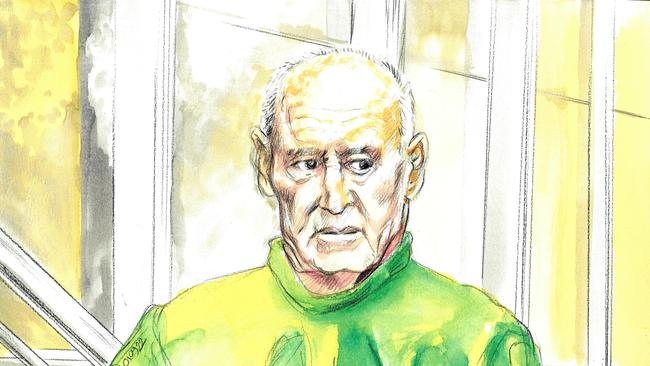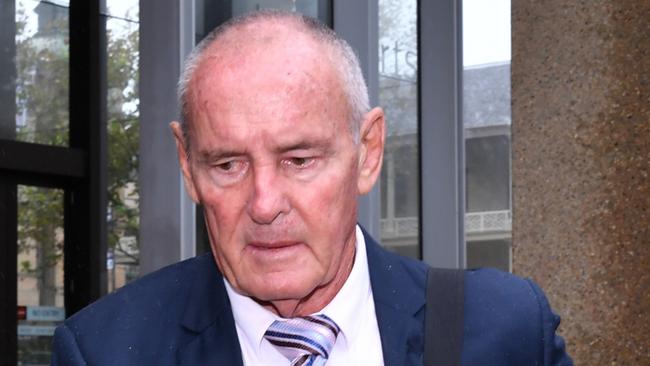Chris Dawson loses appeal against his murder conviction
Former star footballer Chris Dawson has lost an appeal against his murder conviction after being found guilty of killing his wife Lyn Simms more than 40 years ago.

Former star footballer Chris Dawson has lost an appeal against his murder conviction after being found guilty of killing his wife Lyn Simms more than 40 years ago.
President of the NSW Court of Appeal Justice Julie Ward, Justice Christine Adamson and Justice Anthony Payne on Thursday unanimously agreed the appeal should be dismissed, and that no substantial miscarriage of justice had occurred.
He is now likely to spend the rest of his life in prison.
Neither Dawson, 75, nor his lawyers, appeared in court as the orders were handed down.
Dawson was sentenced to 24 years in prison in October 2022, to serve at least 18 years, following The Australian’s investigative podcast series, The Teacher’s Pet, hosted by journalist Hedley Thomas.
The married teacher was found to have killed Lyn so that he could have an unfettered relationship with his babysitter JC, with whom he was having an affair and would later take as his second wife.
His legal team argued a miscarriage of justice occurred at his trial because NSW Supreme Court judge Ian Harrison found beyond reasonable doubt that he did not receive a telephone call from Lyn at the Northbridge Baths on January 9, 1982, and that Lyn was dead by that afternoon.
Dawson also said Justice Harrison made a mistake when he declared Dawson’s lies demonstrated his consciousness of guilt.

While the three judge’s hearing the appeal agreed that Justice Harrison had made an error by relying on certain lies Dawson had told as a consciousness of guilt – meaning two of the five appeal grounds put forward by Dawson’s legal team had been made out – it had not resulted in “substantial miscarriage of justice”, and so the appeal should be dismissed.
At the three-day appeal hearing in May, senior public defender Belinda Rigg SC argued it was possible Lyn abandoned her family because she trusted her “highly capable” husband to run the household, and look after their two children, and that Lyn was “not coping” at the time of her disappearance because Dawson was “not engaging intimately with her”.
This was rejected.
“I consider that the strength of the Crown case … is such as to exclude beyond reasonable doubt the hypothesis that the deceased left her husband, children, family, home and friends (which I regard as no more than fanciful) and prove the guilt of the applicant for her murder on 8 January 1982 or early 9 January 1982,” Justice Adamson wrote.
The Justice said Dawson had contrived the alleged call from Lyn at the Northbridge Baths to explain her absence, calling his statements about the deceased to Lyn’s mother Helena Simms, which must have been lies, “the cruellest because they engendered false hope”.
The panel of judges also rejected Dawson’s ground of appeal that whole verdict was “unreasonable” because the Crown failed to adequately prove Lyn was definitely dead after January 9, 1982.
Dawson’s version of events is that he dropped Lyn off at a Mona Vale bus stop on the morning of January 9, 1982, and that she phoned him later that day to say she needed “time away”.
On January 11, 1982, he collected JC from South West Rocks, 460km north of Sydney, and immediately moved her into the family home, where Lyn’s clothing and jewellery remained.
“As the deceased was intent on staying with him and the children, and retaining close connections with his side of the family (no matter how badly he treated her), killing the deceased on 8 January 1982 or early on 9 January 1982 was the only way in which the applicant could get what he wanted before JC made other arrangements for her adult life and it was too late,” Justice Adamson wrote.
She also said “from about the time the applicant identified JC, he became obsessed with her and wanted to possess and control her at all costs.”
Dawson had also shown himself to be “entirely without credibility, both by reference to direct lies and half-truths, of which there is a litany in the evidence and his versions”.

Ms Rigg also argued during the hearing Dawson was deprived of the right to a fair trial because of the four-decade delay between the crime and his conviction, and claimed there was not “sufficient evidence” to put him behind bars.
This ground also failed, with Justice Adamson saying Dawson “had not established that he had suffered any significant forensic disadvantage because of the consequences of delay”.
The Court also rejected Ms Rigg’s argument that JC had “significant credit issues”.
Police have found no proof Lyn was alive after vanishing and her body has never been found.
Since his murder trial, he has also been convicted of unlawful carnal knowledge of a 16 year-old schoolgirl, and was sentenced to three years’ imprisonment for that offence, meaning whatever the result of the appeal on Thursday, he was unlikely to be released from prison immediately.







